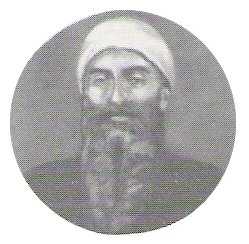Mírzá Músá
| Part of a series on the |
| Apostles of Bahá'u'lláh |
|---|
 |
Mírzá Músá (Persian: میرزا موسى), surnamed Áqáy-i-Kalím; died 1887) was the only true brother of Bahá'u'lláh, meaning that they shared the same mother. He was later named by Shoghi Effendi as one of the nineteen Apostles of Bahá'u'lláh.

The life of Mírzá Músá was so inextricably bound up with that of Bahá'u'lláh himself, that his life and background mirror the life and travels of Bahá'u'lláh. He was an integral part of correspondence between Bahá'u'lláh and the Bahá'ís. He experienced the same imprisonment, exile, assaults, and degrading circumstances that were given to the small band of family members associated with Bahá'u'lláh and `Abdu'l-Bahá. In the history of the Bahá'í cause, Mírzá Músá stands out as a loyal and faithful follower until the end.
Bahá'u'lláh used Mírzá Músá as an example to show his respect for the law. When an official expressed hesitation to inflict punishment on one of the followers of Bahá'u'lláh who had committed a crime, he replied:
- "Tell him, no one in this world can claim any relationship to Me except those who, in all their deeds and in their conduct, follow My example, in such wise that all the peoples of the earth would be powerless to prevent them from doing and saying that which is meet and seemly... This brother of Mine, this Mirza Musa, who is from the same mother and father as Myself, and who from his earliest childhood has kept Me company, should he perpetrate an act contrary to the interests of either the state or religion, and his guilt be established in your sight, I would be pleased and appreciate your action were you to bind his hands and cast him into the river to drown, and refuse to consider the intercession of any one on his behalf."
- (Shoghi Effendi, God Passes By, p. 133)
Family
Mírzá Músá's son, Mirza Majdi'd-Din for a time transcribed the Tablets of Bahá'u'lláh, but later became "the most redoubtable adversary of `Abdu'l-Bahá" by supporting Mírzá Muhammad `Alí, the arch-breaker of the Covenant. He was the one who read the Kitáb-i-'Ahd in front of the family upon the passing of Bahá'u'lláh.
References
- Effendi, Shoghi (1944). God Passes By. Wilmette, Illinois, USA: Bahá'í Publishing Trust. ISBN 0-87743-020-9.
External links
| |||||||||||||||||||